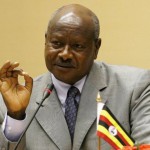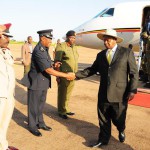President Yoweri Kaguta Museveni has urged African leaders to confront and dismantle the persistent strategic bottlenecks that continue to impede the continent’s journey toward genuine socio-economic transformation.
While officially opening the 8th African Leadership Forum at Speke Resort, Munyonyo yesterday,Museveni emphasized that Africa must go beyond mere survival and aim for meaningful growth through deliberate transformation.
“This theme of sustainable development has been around for long. But our question has always been, how do you sustainably remain an infant? A baby must grow. At some stage, you must undergo transformation, just like in biology where a caterpillar turns into a butterfly,” Museveni said.
This year’s forum is focused on assessing Africa’s progress in achieving the Sustainable Development Goals (SDGs), identifying key challenges, and proposing innovative, home-grown solutions to issues like climate change, education, health, and youth unemployment. It is being held under the theme: “Realizing Sustainable Development Goals in Africa: Progress and Way Forward.”
The gathering has attracted distinguished leaders from across the continent, including former Presidents H.E. Dr. Ernest Bai Koroma (Sierra Leone), H.E. Dr. Moncef Marzouki (Tunisia), and H.E. Hailemariam Desalegn Boshe (Ethiopia).
The African Leadership Forum (ALF), established in 2014 by the late President Benjamin Mkapa of Tanzania in collaboration with the UONGOZI Institute, seeks to create a platform where current and former leaders engage in meaningful dialogue on Africa’s challenges and opportunities.
Delivering a keynote address, President Museveni reminded delegates that Africa’s first post-independence challenge was political power, but that alone was not enough.
“You can’t have an army without a historic mission. The British army was the imperial army. The American army exists to defend capitalism. The Red Army stood for the peasants and workers. So, what do our African armies stand for? You cannot be a soldier without a mission.”
He criticized the dominance of identity-based politics, which he said has weakened African states and hindered development.
“If your politics is based on tribes, religion or gender, how will you build a strong state? Wrong politics have created weak states. You need a liberation movement with clarity to build capable structures,” he added.
Reflecting on economic policy missteps, Museveni pointed to Uganda’s own history under Idi Amin, when Indian entrepreneurs were expelled, leading to a collapse in economic productivity. He warned against repeating such errors.
“Entrepreneurs are critical. When we expelled the Indians, we lost a lot. They were helping us. That was another strategic bottleneck.”
On the issue of raw material exports, Museveni decried the practice as a loss of wealth and jobs to the rest of the world.
“When you export raw coffee, you get $2.5 per kilogram. But when someone adds value—roasts, grinds, and packages it—they earn up to $40. So, in every kilogram, Africa donates over $20 to the world.”
He also condemned the export of raw minerals like iron ore, calling it a squandered opportunity for industrial growth.
“Why export raw iron ore? Let it stay in the ground until we’re ready to add value here. Raw materials are a curse if you don’t use them properly.”
Museveni highlighted the need for regional market expansion, noting that Uganda produces 5.3 billion litres of milk annually, yet domestic consumption accounts for only 200 million litres.
“We need bigger markets,” he said, adding that infrastructure must go beyond roads to include rail and water transport for efficient movement of goods and services.
He also underscored the importance of human capital in national transformation, pointing out that education, health, and skills development remain key.
On poverty, Museveni said a large portion of the African population remains trapped in subsistence farming. He credited Uganda’s shift toward commercial production to government-led interventions like Entandikwa, NAADS, and Operation Wealth Creation.
“By 2013, only 32% were in the money economy. We involved the army under Operation Wealth Creation, and the figure jumped to 65%.”
He concluded by tracing Uganda’s economic journey through six phases—from minimum recovery to expansion, diversification, value addition, the knowledge economy, and now science and innovation.
“Whenever we talk of sustainable development, this is what we mean—building a new economy, driven by transformation.”
In his remarks, former Tanzanian President Jakaya Kikwete urged African leaders to take bold and practical steps to accelerate SDG progress.
“We hope that this African Leadership Forum will serve as a call for bold and proactive solutions, and for a renewed commitment across the continent. The outcomes must go beyond recommendations; they must lead to practical solutions that can be implemented.”
Kikwete praised Uganda’s hospitality and Museveni’s commitment to the forum, adding that the event has evolved into a unique space for honest and strategic discussions about Africa’s future.
“Over the years, the forum has become a unique platform that enables candid conversations on Africa’s development trajectory, global trends, and the continent’s response to emerging challenges.”








